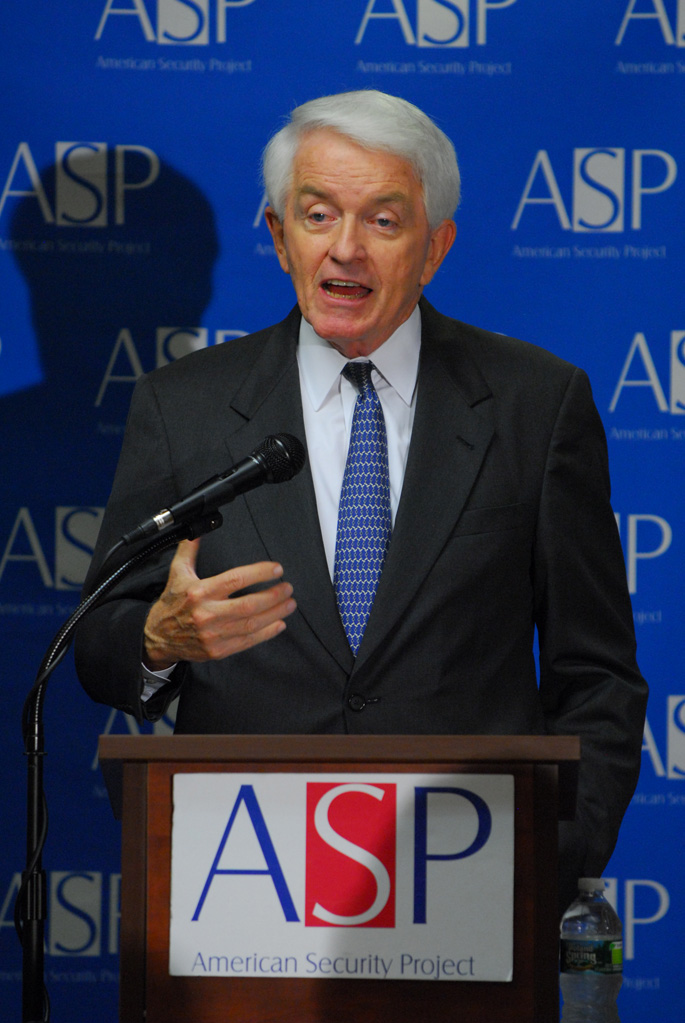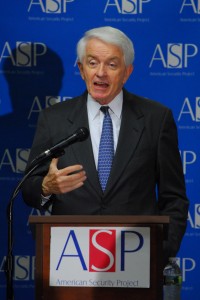
US Chamber of Commerce President Tom Donohue speaks at ASP
Podcast: Play in new window | Download
Subscribe: Apple Podcasts | RSS
CLICK HERE TO LISTEN
Today the American Security Project hosted Thomas J. Donohue, President and CEO of the US Chamber of Commerce, who spoke on American competitiveness, the Law of the Sea Treaty, the indivisible relationship between economic strength & national security. Donohue gave his views on how the United States can strengthen its economy to bolster national security, focusing mainly energy production as the answer.
He explained the link of national security and the economy:
“If you don’t have one, you can’t have the other… It’s simple as this: we need prosperity to pay for security and without security we can’t have prosperity.”
The lack of substantial growth in the American economy is bringing American economic preeminence and world power status into question, he said. To that end, there needs to be a linkage of economics and diplomacy, which he praised Secretary Clinton for doing at the State Department.
“Economic statecraft recognizes that we have to advance our global leadership at a time where power is more often measured and exercised in economic terms.”
Donohue began highlighting the ways he thinks the US can strengthen the economy by saying:
“Economic growth can’t be generated without the private sector and the private sector cannot generate economic growth without realistic policies from government that support business and job creation.”
He then detailed specifics starting with ratification of the Law of the Sea Treaty as “one of the really important things our government can do to bolster our economy, enhance our national security, and to reassert our global leadership.” He continued by listings the vast benefits for both the US economy and national security, echoing his testimony to the Senate Foreign Relations Committee and op-eds. The US is losing out on economic opportunities and will not have a say in maritime laws if its not ratified.
Donohue emphasized the importance of ensuring safe passage in shipping lanes as another critical reason for ratification because seafaring vessels transport more than 95% of all the goods in and out of the US.
In response to those who are against the treaty, despite all the problems the US had with it being fixed in 1994, Donohue said:
“So if we want to be isolationists, if we want everybody else to have to have the opportunity to deal in these issues without us then maybe we’re doing the right thing. But I don’t think so.”
When asked if businesses have a problem with being a part of an international regulatory body, Donohue replied:
“Across the board businesses large and small want to do this deal.”
In response to a question on whether or not the Law of the Sea Treaty is dead, as there are now enough votes against it in the Senate to block ratification, he said: “It’s just a temporary inconvenience.”
Donohue highlighted the importance of the Law of the Sea Treaty as a way to boost domestic energy production by giving businesses the legal certainty then need to invest in offshore drilling.
“Developing energy off our coasts would have huge economic and national security benefits to us and so would developing our onshore resources and strengthening our infrastructure and we can do so in an environmentally friendly way.”
Donohue stressed that “energy underpins a robust economy” and that currently the US isn’t utilizing its resources it has because they are in federal lands that are off limits. He advocated unlocking these lands, some 86% of offshore lands and 80% of onshore, and taking an inclusive, “all of the above approach” to the means of energy production.
However, he continued, the other half of the energy security puzzle is the ability to maintain the energy infrastructure. He pointed out the vulnerability of the current US electrical system and questioned if blackouts like in India could happen here as well as the threat of terrorism. Donohue stressed the need to reduce the regulatory red tape to update our current system.
“Energy is every bit of a national security issue as it is an economic one.”
He used the example of “the Canadian miracle,” how the Canadians were able to avoid the economic crash, as an example of the importance of energy as an economic booster.
“The key was they had a cash cow… and that cash cow was energy… We have the largest cash cow in the world and we ought to figure out how to use it.”
He also highlighted the need for effective cyber security and trade agreements as well as more investment in Africa and the growing of the private sector through free enterprise.
Overall, Donohue stressed the importance of “energy, energy, energy” as the key to continued American competitiveness.







[…] Check out the video of the event: […]
[…] Check out the review, audio and video of the event here […]
[…] US Chamber of Commerce President Tom Donohue speaks at ASP […]
[…] use the words of US Chamber of Commerce President and CEO Thomas J. Donohue, “it’s a temporary […]